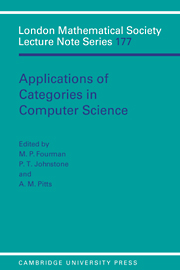 Applications of Categories in Computer Science
Applications of Categories in Computer Science Published online by Cambridge University Press: 24 September 2009
Abstract
Fibrations have been widely used to model polymorphic λ-calculi. In this paper we describe the additional structure on a fibration that suffices to make it a model of a polymorphic λ-calculus with subtypes and bounded quantification; the basic idea is to single out a class of maps, the inclusions, in each fibre. Bounded quantification is made possible by a imposing condition that resembles local smallness. Since the notion of inclusion is not stable under isomorphism, some care must be taken to make everything strict.
We then show that PER models for λ-calculi with subtypes fit into this framework. In fact, not only PERs, but also any full reflective sub category of the category of modest sets (‘PERs’ in a realizability topos), provide a model; hence all the small complete categories of ‘synthetic domains’ found in various realizability toposes can be used to model subtypes.
Introduction
What this paper is about
At the core of object-oriented programming, and related approaches to programming, are the notions of subtyping and inheritance. These have proved to be very powerful tools for structuring programs, and they appear—in one form or another—in a wide variety of modern programming languages.
One way of studying these notions formally is to use the framework of typed λ-calculus. That is, we start with a formal system (say, a version of the polymorphic λ-calculus) and extend it by adding a notion of type inclusion, together with suitable rules; we obtain a larger system. We can then use the methods of mathematical logic to study the properties of the system.
To save this book to your Kindle, first ensure no-reply@cambridge.org is added to your Approved Personal Document E-mail List under your Personal Document Settings on the Manage Your Content and Devices page of your Amazon account. Then enter the ‘name’ part of your Kindle email address below. Find out more about saving to your Kindle.
Note you can select to save to either the @free.kindle.com or @kindle.com variations. ‘@free.kindle.com’ emails are free but can only be saved to your device when it is connected to wi-fi. ‘@kindle.com’ emails can be delivered even when you are not connected to wi-fi, but note that service fees apply.
Find out more about the Kindle Personal Document Service.
To save content items to your account, please confirm that you agree to abide by our usage policies. If this is the first time you use this feature, you will be asked to authorise Cambridge Core to connect with your account. Find out more about saving content to Dropbox.
To save content items to your account, please confirm that you agree to abide by our usage policies. If this is the first time you use this feature, you will be asked to authorise Cambridge Core to connect with your account. Find out more about saving content to Google Drive.